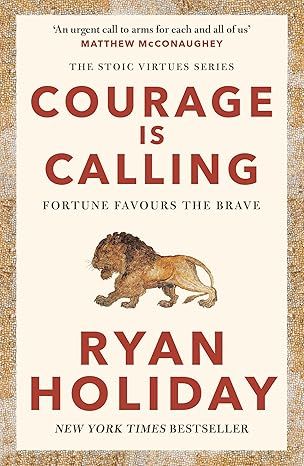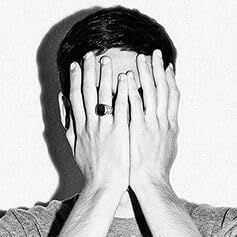Courage Is Calling
4.6
-
4,763 ratings
INSTANT NEW YORK TIMES BESTSELLER
'An urgent call to arms for each and all of us.' Matthew McConaughey
'Ryan Holiday is a genius.' Chris Evans
'A clear and inspiring guide for how to develop this highest of human virtues.' - Robert Greene
An inspiring anthem to the power, promise, and challenges of courage, the first in a series examining the timeless Stoic virtues from #1 New York Times bestselling author Ryan Holiday
Fortune favours the bold. All great leaders of history have known this, and were successful because of the risks they dared to take. But today so many of us are paralysed by fear.
Drawing on ancient Stoic wisdom and examples across history and around the world, Ryan Holiday shows why courage is so important, and how to cultivate it in our own lives. Courage is not simply physical bravery but also doing the right thing and standing up for what you believe; it's creativity, generosity and perseverance. And it is the only way to live an extraordinary, fulfilled and effective life.
Everything in life begins with courage. This book will equip you with the bravery to begin.
Kindle
$14.99
Available instantly
Audiobook
$0.00
with membership trial
Hardcover
$14.89
Paperback
$13.35
Ships from
Amazon.com
Payment
Secure transaction
ISBN-10
1788166280
ISBN-13
978-1788166287
Print length
304 pages
Language
English
Publisher
Profile Books
Publication date
September 07, 2022
Dimensions
5.04 x 1.18 x 7.72 inches
Item weight
2.31 pounds
Popular Highlights in this book
There is nothing worth doing that is not scary. There is no one who has achieved greatness without wrestling with their own doubts, anxieties, limitations, and demons.
Highlighted by 3,847 Kindle readers
There are always more of them before they are counted. The obstacles, the enemies, the critics—they are not as numerous as you think. It’s an illusion they want you to believe.
Highlighted by 3,618 Kindle readers
Don’t worry about whether things will be hard. Because they will be. Instead, focus on the fact that these things will help you. This is why you needn’t fear them.
Highlighted by 3,476 Kindle readers
Product details
ASIN :
B0947VHKC2
File size :
5586 KB
Text-to-speech :
Enabled
Screen reader :
Supported
Enhanced typesetting :
Enabled
X-Ray :
Enabled
Word wise :
Enabled
Editorial Reviews
"Worthy for anyone trying to develop their own code, this is a superb handbook for crafting a purposeful life. Masterfully composed and highly readable, using stories from antiquity to the modern-day realities confronting all leaders, the 'march' of the chapters brings forward valuable gems on each page of the journey. Holiday’s themes will remain with you and strengthen you long after you finish reading it." --General Jim Mattis, U.S. Marines (ret.) and 26th US Secretary of Defense
"Ryan Holiday’s Courage is Calling traces the history of courage and its many faces through the ages and arrives at the present day with an urgent call to arms for each and all of us. As we battle our enemies within and without, will we choose to rise-up to the call of our courage or blush and bow down to the whispers of our cowardice? Our answer to this question is about more than our sense of duty, it’s about our freedom. It’s about more than wins and losses, it’s about our survival. It’s on me, it’s on you, it’s on us. Take the dare we may." --Matthew McConaughey, Academy Award Winning Actor and New York Times #1 best-selling author
“[Courage Is Calling] dresses us with the proper garments of courage, something we need more than ever.” --George Raveling, Hall of Fame Basketball coach, Nike’s first Director of International Basketball
“Ryan Holiday shows his own courage in this book to not toe the line, to speak truth to power, and show us all why we must not defer to fear if we are to go forward together with grace and humanity. Drawing on examples across history--from the ancient Greek and Roman world to Florence Nightingale to his own critique of ‘hollow courage’ in our own times, Holiday shows why virtue matters now more than ever.” --Nancy Sherman, Professor of Philosophy at Georgetown University
"In a world full of people riddled with fears and deeply afraid of sticking their necks out, our salvation lies in cultivating courage in all arenas of life. In this book Ryan Holiday has provided a clear and inspiring guide for how to develop this highest of human virtues." --Robert Greene, #1 New York Times bestselling author of The 48 Laws of Power
“In this clarion call to act on your convictions, Holiday draws on a remarkable range of figures from Socrates to Solzhenitsyn. A heartfelt and passionate book.” --Shadi Bartsch, Classics Professor at the University of Chicago
Read more
Sample
The Call We Fear . . .
Before she knew any better, Florence Nightingale was fearless.
There's a little drawing done sometime in her early childhood. An aunt captured Florence walking with her mother and her sister, when she was maybe four years old.
Her older sister clings to her mother's hand. Meanwhile, Florence "independently stumps along by herself," with that wonderful innocent confidence some children have. She didn't need to be safe. She didn't care what anyone else thought. There was so much to see. So much to explore.
But sadly, this independence was not to last.
Maybe somebody told her the world was a dangerous place. Maybe it was the imperceptible but crushing pressure of her times, which said that girls should behave a certain way. Maybe it was the luxury of her privileged existence, which softened her sense of what she was capable of.
Each of us has had some version of this conversation, when an adult does us the cruel injustice-whatever their intentions-of puncturing our little bubble. They think they are preparing us for the future, when really they're just foisting upon us their own fears, their own limitations.
Oh, what this costs us. And what courage it deprives the world.
As it nearly went for Florence Nightingale.
On February 7, 1837, at age sixteen, she was to get what she was later to refer to as the "call."
To what? To where? And how?
All she could feel was that it was a mysterious word from on high which imparted to her the sense that something was expected of her, that she was to be of service, to commit to something different than the life of her rich and indolent family, something different than the constraining and underwhelming roles available to women in her time.
"Somewhere inside, we hear a voice . . . ," Pat Tillman would say as he considered leaving professional football to join the Army Rangers. "Our voice leads us in the direction of the person we wish to become, but it is up to us whether or not to follow. More times than not we are pointed in a predictable, straightforward, and seemingly positive direction. However, occasionally we are directed down a different path entirely."
You might think that a brave girl like Florence Nightingale would be primed to listen to that voice, but like so many of us, she had internalized the beliefs of her time, becoming a scared teenager who could not dare to imagine a path other than that of her parents.
"There was a large country house in Derbyshire," Lytton Strachey wrote in his classic Lives of Eminent Victorians, "there was another in the New Forest; there were Mayfair rooms for the London season and all its finest parties; there were tours on the Continent with even more than the usual number of Italian operas and of glimpses at the celebrities of Paris. Brought up among such advantages, it was only natural to suppose that Florence would show a proper appreciation of them by doing her duty in that state of life unto which it had pleased God to call her-in other words, by marrying, after a fitting number of dances and dinner-parties, an eligible gentleman, and living happily ever afterwards."
For eight years this call sat there in the recesses of Florence's mind like an elephant in the room, not to be addressed. Meanwhile, she was vaguely aware that all was not right in the Victorian world. Life expectancy was barely forty years at birth. In many cities, mortality was higher for patients treated inside hospitals than outside them. In the Crimean War, where Nightingale would later distinguish herself, just eighteen hundred men out of some hundred thousand troops died of their wounds. More than sixteen thousand died of disease, and thirteen thousand more were rendered unable to serve. Even in peacetime, conditions were terrible, and to enlist was itself life-threatening. "You might as well take 1,100 men every year out upon Salisbury Plain and shoot them," she once told officials.
But as urgent as that crisis was-as fast as the altar of murdered men grew-the fear was greater.
There was china to look after, Strachey wrote. Her father expected her to read to him. She needed to find someone to marry. There was gossip to discuss. There was nothing to do, and that was all that a woman of means was allowed to do: nothing.
Barraged with this banal pressure, Florence tuned out the call, afraid to let it intrude on polite society. Sure, she helped the occasional sick neighbor. She read books. She met interesting people like Dr. Elizabeth Blackwell, the first female doctor. But still, at twenty-five, when she was offered an opportunity to volunteer at the Salisbury Hospital, she let her mother squelch it. Work in a hospital? Why, they'd sooner she become a prostitute!
After eight years of denial, another call came. The voice asked, more pointedly this time: Are you going to let reputation hold you back from service? That was precisely the fear: What would people think? Could she break with the family who wished to hold her close to them? To go from a rich debutante to a nurse? Could she pursue a vocation she knew next to nothing about-which in the nineteenth century hardly existed? Could she do what women were not supposed to do? Could she succeed at it?
This fear was strong, as it is in every person when they consider uncharted waters, when they consider blowing up their lives to do something new or different. When everyone tells you that you'll fail, that you're wrong, how could you not listen? It's a terrible paradox: You'd have to be crazy not to hear them when they tell you you're crazy.
And what about when they try to guilt you? When they try to punish you? What if you're afraid to let people down? That's what Nightingale faced. Parents who took her ambition as an indictment of their own lack of ambition. Her mother wept that she was planning to "disgrace herself," while her father raged at her for being spoiled and ungrateful.
These were painful lies that she internalized. "Dr. Howe," Florence once ventured to ask Julia Ward Howe, philanthropist and author of the "Battle Hymn of the Republic," "do you think it would be unsuitable and unbecoming for a young Englishwoman to devote herself to works of charity in hospitals? Do you think it would be a dreadful thing?" Her questions were loaded with some many assumptions. Unsuitable. Unbecoming. Dreadful.
She was torn-did she want permission to follow her dream, or permission to leave it unfulfilled? "My dear Miss Florence," Howe answered, "it would be unusual, and in England whatever is unusual is thought to be unsuitable; but I say to you 'go forward,' if you have a vocation for that way of life, act up to your inspiration and you will find there is never anything unbecoming or unladylike in doing your duty for the good of others. Choose, go on with it, wherever it may lead you."
But that fear of being unusual, of more guilt trips, more threats, remained. All of it was designed to keep her at home, to keep her within bounds. And as is so often the case, it worked-despite the explicit encouragement from someone she admired.
"What a murderer am I to disturb their happiness," Florence would write in her diary. "What am I that their life is not good enough for me?" Her family would hardly speak to her, she recounted, "I was treated as if I had come from committing a crime." For years, these tactics worked. "She had the capacity to assert herself," her biographer Cecil Woodham-Smith writes, "but she did not. The bonds which bound her were only of straw, but she did not break them."
Nightingale was not the exception in this-in the 1840s or today. Indeed, in the so-called Hero's Journey, the "call to adventure" is followed in almost all cases by what? The refusal of the call. Because it's too hard, too scary, because they must obviously have picked the wrong person. That's the conversation Nightingale had with herself, not for a little while but for sixteen years.
Fear does this. It keeps us from our destiny. It holds us back. It freezes us. It gives us a million reasons why. Or why not.
"How very little can be done under the spirit of fear," Nightingale would later write. A good chunk of the first three decades of her life had been proof. But she also knew that there had been a brief moment where she had not been afraid. She needed to seize that power inside herself, to break out on her own and accept the call she had been given to hear.
It was a scary, terrifying leap. Walking away from a life of ease. Flouting convention. The chorus of doubts and demands. Of course this had held her back-it holds so many of us back. But for Nightingale it would no longer. Two weeks later, she took the leap.
"I must expect no sympathy or help from them," she wrote of her decision to break free. "I must take some things, as few as I can, to enable me to live. I must take them, they will not be given to me."
Within a year, she was setting up field hospitals for wounded troops in Crimea. The conditions were horrendous. Men died in the halls of buildings and on the decks of ships for lack of beds. Rats stole food from their plates. Patients huddled in freezing hospitals without clothes, some spending their last moments on earth completely naked. Their rations were unsuitable, and their doctors incompetent. It was everything her parents had tried to prevent her from sullying herself with. It was enough to scare away even the bravest of public servants.
"I have been well acquainted," she explained, "with the dwellings of the worst parts of most of the great cities in Europe, but have never been in any atmosphere which I could compare with that of the Barrack Hospital at night." By now the fear was gone. In its place was steely determination. She funded the repairs out of her own pocket and got to work.
Henry Wadsworth Longfellow would capture her heroic image perfectly in one of his poems, contrasting the dreary, cheerless corridors of the hospital with the image of Florence Nightingale, going from room to room, carrying a lamp and her good cheer.
On England's annals, through the long
Hereafter of her speech and song,
That light its rays shall cast
From portals of the past.
A Lady with a Lamp shall stand
In the great history of the land,
A noble type of good,
Heroic womanhood.
Heroic, period. Possible only because she was brave enough to overcome those pedestrian but powerful fears.
Her work in Crimea, done under fire and at grave personal risk-indeed, she picked up "Crimean fever" (brucellosis), which plagued her for the rest of her life-would inspire the founding of the Red Cross. Her innovations, her pioneering work afterward in systematizing the care of the sick and vulnerable, continues to benefit anyone who has ever been to a hospital in the 180 years since she stepped off the path that so many others had tried to intimidate her into staying on.
Her mother had wept when her daughter asserted herself. "We are ducks who have hatched a wild swan," she said. Imagine crying because your child turned out to be special. Imagine growing up in a house where that happened. As Strachey would write, Nightingale's mother was incorrect. Her daughter was not a swan. They had birthed an eagle. It had been a long time incubating, a long time in the nest, but once it flew, it was fearless.
What we are to do in this life comes from somewhere beyond us; it's bigger than us. We are each called to be something. We are selected. We are chosen . . . but will we choose to accept this? Or will we run away?
That is our call.
One way to see Nightingale's story is that she spent years ignoring her call to service. The other is that she was preparing herself for the mission of her life. It took time for her to see through the smoke and noise of the family and society that attempted to discourage her from doing what needed to be done. It took time for her to acquire the skills she needed to transform nursing.
In either version, fear-and the triumph over it-is the defining battle of her existence. Just as it has been for anyone who has changed the world. There is nothing worth doing that is not scary. There is no one who has achieved greatness without wrestling with their own doubts, anxieties, limitations, and demons.
As it turns out, for Nightingale this experience was itself formative. When she finally threw herself into the establishment of hospitals and the reformation of Britain's military and civilian health systems, she faced incredible opposition-from bureaucracy, from the elements, from the political powers that be. She had to be more than an angel of mercy in the sick ward: She was a quartermaster, a shadow secretary, a lobbyist, a whistleblower, an activist, and an administrator. It would be her ability to do this, persisting in the face of this relentless and intimidating opposition, to wage a patient but indefatigable battle against those who wanted to deter her, that would make her work possible.
No one could intimidate her any longer. She could not be bullied.
"Your letter is written from Belgrave Square," she said in a letter challenging Britain's secretary of state for war, "I write from a hut in the Crimea. The point of site is different." This from the woman who a few months earlier was afraid to disappoint her hysterical mother. Now when a doctor-or anyone-told her that something could not be done, she replied with quiet authority, "But it must be done." And if it wasn't-for instance, when a hospital she worked at refused to admit Catholics and Jews-she threatened to resign. They got the message.
Her experiences with fear helped her relate to and love the thousands of wounded, dying patients she would care for. "Apprehension, uncertainty, waiting, expectation, fear of surprise, do a patient more harm than any exertion," Nightingale wrote. "Remember he is face to face with his enemy all the time, internally wrestling with him, having long imaginary conversations with him." This was a battle she knew firsthand, one she could help them win.
Today, each of us receives our own call.
To service.
To take a risk.
To challenge the status quo.
To run toward while others run away.
To rise above our station.
Read more
About the authors
Ryan Holiday
Ryan Holiday is one of the world's bestselling living philosophers. His books like The Obstacle Is the Way,Ego Is the Enemy,The Daily Stoic, and the #1 New York Times bestseller Stillness Is the Key appear in more than 40 languages and have sold more than 5 million copies. Together, they've spent over 300 weeks on the bestseller lists. He lives outside Austin with his wife and two boys...and a small herd of cows and donkeys and goats. His bookstore, The Painted Porch, sits on historic Main St in Bastrop, Texas.
Read more
Reviews
Customer reviews
4.6 out of 5
4,763 global ratings
Rainier
5
Another good book from Ryan Holiday
Reviewed in the United States on March 28, 2024
Verified Purchase
This book is the second in this series that I have read, and like his other book, very worth reading. I really enjoy the way he uses the experiences of people from our times to illustrate the Stoic principles, and so proving that they are as applicable to us today was they were in ancient times. It is also comforting to read that they were living in as chaotic times as we are, and this gives me hope for the future.
Read more
2 people found this helpful
Dennis Daughtridge
5
Motivational and Inspiring
Reviewed in the United States on June 27, 2024
Verified Purchase
A great book for anyone needing a boost and reminder that courage can be found, even when things feel difficult and hard to overcome. Like the writing style of author, using historical figures and storylines to drive the point home. Now read in another of his books, The Obstacle Is The Way- enjoying that so far also.
2 people found this helpful
Cole B
5
Eminently readable and portable
Reviewed in the United States on August 27, 2022
Verified Purchase
What do I mean by portable? This book does not require the reader to dedicate hours of contemplation to each chapter or page. I read most of this book in waiting rooms or on breaks at work. It's very digestible like that. Ryan Holiday really did an excellent job pacing the book and breaking up its chapters.
It's not some deep treatise on the philosophical notions of courage. It's an evidence-based, historical approach to the Stoic virtue of courage. Courage is not the absence of fear -- it's moving forward in spite of your fear, or because of it.
Others have been in worse situations than you. Others have done this task before. "What one man can do another can do" is a mantra from one of my favorite movies. You can have courage. You can do the right thing.
Also, I really enjoyed the last chapter. Maybe I've missed it, but I've never heard Holiday go into depth about his life before Daily Stoic. I knew he was a marketing executive at American Apparel, but that was it. I knew there'd been some scandal with the CEO. But that was all I knew and all I cared to know. But Holiday opens up and writes about what happened, his role, and his regrets. He explains where he failed to have courage, and when he began to have it. It was a really honest look back, and one that I truly appreciated because we all have been there -- maybe not at a major company, but certainly all of us have been moral cowards at various points in our lives.
While I've always appreciated Holiday's efforts at bringing Stoicism to modern life, that last chapter really made me love and respect him. It's what led me to write this review, in fact.
Read more
11 people found this helpful
Troy Tolar
5
INTEGRITY & CHARACTER
Reviewed in the United States on July 29, 2024
Verified Purchase
I really enjoyed the stories in this book and has great motivation to have courage to do the right thing, even when it means standing alone or going against the grain.
Beguiled By Books
5
New Stoic Series on Stoic Virtues!
Reviewed in the United States on July 21, 2023
Verified Purchase
Ryan Holiday has been one of my favorite authors since 2018. I’ve written about his books before, and they are consistently in my Best Books lists. In 2019, Holiday released the last of three books written about Stoic philosophy in today’s world, Stillness is the Key. The other two are Ego Is the Enemy and The Obstacle is the Way. I also read a standalone of Holiday’s called Conspiracy: A True Story of Power, Sex, and a Billionaire’s Secret Plot to Destroy a Media Empire, which is still one of the craziest stories. Then, I discovered (well before a formal announcement) that Courage is Calling: Fortune Favors the Brave would be published in September 2021. I immediately ordered it and, once released, read it in one sitting.
Courage is Calling is the first of four books on the four Stoic virtues: Courage, Temperance, Justice, and Wisdom. Holiday shares real stories of courage in it, but not always in the heroic, action-movie way. Holiday goes on to describe the many faces of courage. Yes, sometimes courage is six seconds of bravery from two young Marines giving their lives to stop a truck rigged to blow up the nearby base. However, sometimes courage is quietly pursuing a path and defying convention or your family. Courage is doing the right thing when no one is looking. Courage says, “If not me, then who?”
I found myself highlighting something on nearly every page of this book. There are so many meaningful quotes to help keep you going in the face of tough choices, which is the other facet to this book: choice. Courage is a choice. You will have moments where you didn’t make the courageous choice, but the point of all of this – of life – is choice. Courage takes practice. It’s in the little moments that you think don’t matter, but those little moments train you for the big moments.
Holiday discusses fear, and its relationship to courage, throughout the book. It’s no surprise that fear keeps us from courage. It keeps us in the dead-end job, the relationship you’ve outgrown, the city you don’t love. But, as Holiday discusses, fear isn’t the opposite of courage – it’s apathy. Doing nothing, being cynical, assuming your actions don’t matter – that’s the opposite of courage. Courage is a choice. You might make the right choice. You might make the wrong one. Regardless, choosing something holds power and takes courage. Just like Gandalf says, “All we have to decide is what to do with the time that is given us.”
Choose courage. Have hope. Go first. Leave the job. Ask that person on a date. Buy the book. Choose to do something. You’ll be happy you did something, but you’ll regret doing nothing.
Read more
12 people found this helpful
Top Ryan Holiday titles
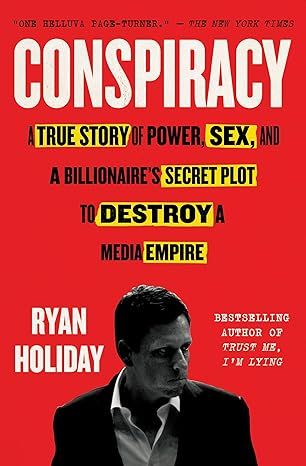
Conspiracy: A True Story of Power, Sex, and a Billionaire's Secret Plot to Destroy a Media Empire
4.3
-
1,965
$5.99
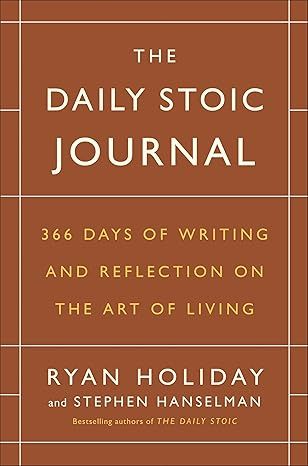
The Daily Stoic Journal: 366 Days of Writing and Reflection on the Art of Living
4.7
-
2,537
$15.99
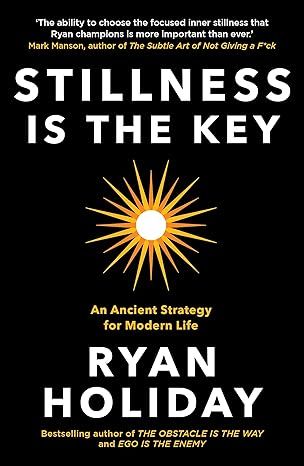
Stillness is the Key: An Ancient Strategy for Modern Life
4.7
-
9,966
$8.99
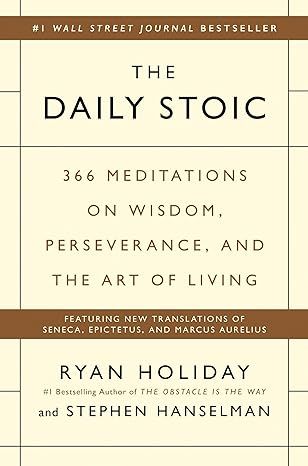
The Daily Stoic: 366 Meditations on Wisdom, Perseverance, and the Art of Living
4.8
-
32,641
$13.00
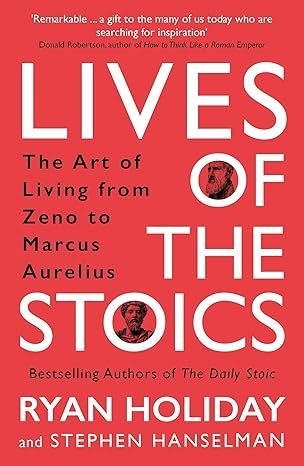
Lives of the Stoics: The Art of Living from Zeno to Marcus Aurelius
4.7
-
2,858
$8.99
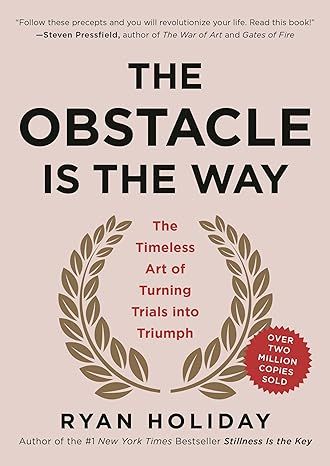
The Obstacle Is the Way: The Timeless Art of Turning Trials into Triumph
4.6
-
28,125
$4.99
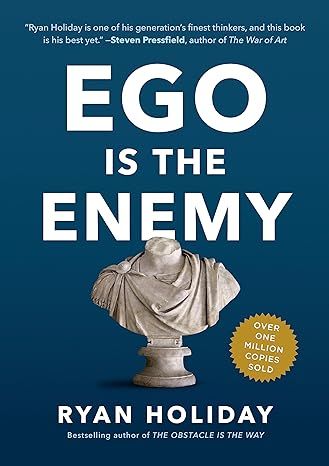
Ego is the Enemy: The Fight to Master Our Greatest Opponent
4.6
-
20,573
$11.99
Best Sellers

The Tuscan Child
4.2
-
100,022
$8.39

The Thursday Murder Club: A Novel (A Thursday Murder Club Mystery)
4.3
-
155,575
$6.33

Sapiens: A Brief History of Humankind
4.6
-
140,302
$13.49

The Butterfly Garden (The Collector, 1)
4.3
-
88,556
$9.59

Things We Hide from the Light (Knockemout Series, 2)
4.4
-
94,890
$11.66

The Last Thing He Told Me: A Novel
4.3
-
154,085
$2.99

The Perfect Marriage: A Completely Gripping Psychological Suspense
4.3
-
143,196
$9.47

The Coworker
4.1
-
80,003
$13.48

First Lie Wins: A Novel (Random House Large Print)
4.3
-
54,062
$14.99

Mile High (Windy City Series Book 1)
4.4
-
59,745
$16.19

Layla
4.2
-
107,613
$8.99

The Locked Door
4.4
-
94,673
$8.53
